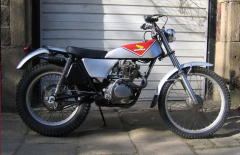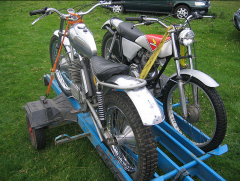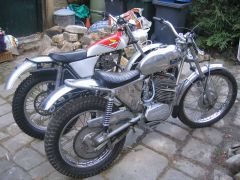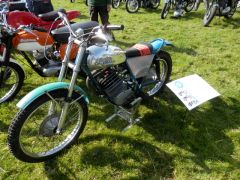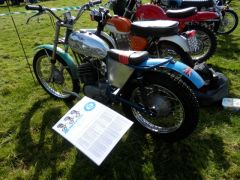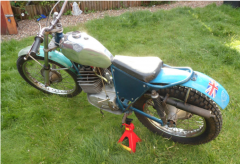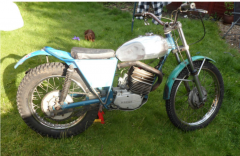
yam 22
Members-
Posts
36 -
Joined
-
Last visited
-
Thanks 'pro sport' for your support and sorry to confuse 'andy'. Yes the above article was researched and written by me so the copyright is mine. Totally happy to have it shown on this site for others to read. Just researched the subject as own both a Wassell & a Dalesman but couldn't find any detailed article written about the subject so tried to do one myself. Many thanks to Peter Edmondson, Bill Brooker and all the others who kindly spent their own time speaking to me and giving information. Since writing mine though, I notice that there's been a much better article written recently and published on line. cheers, Jez
-
-
hi victor1, Just read your post about trying to get hold of low front mudguard brackets. My post is an old one and since then I have not only had a new replacement pair fabricated ...... but then also managed to find an original pair. The originals though are in bad condition & needing welding. When I've had this welding repair work carried out then you'd be more than welcome to have the new replacement set I had made. These are not exact copies though as I didn't have any original measurements to go by ..... just worked from photos of the internet and used steel (not aluminium as they should be). hi gordo, Wassell offered both a high & low front mudguard trials option from new.
-
hi Deryk, Would you know if this 'sleeping' Dalesman in the barn was an earlier model (with the Puch engine) or the later one (with Sach engine) ? Thanks
-
if anyone is interested ....... I've done a bit of research since first posting on this site. I was specifically interested in Pete Edmondson ..... and his links with both the Dalesman and the Wassell marques. Also managed to buy one of each and currently trying to restore them. Dalesman Motorcycles Otley, Yorkshire. Dalesman Motorcycles were manufactured in Otley, West Yorkshire from 1968 to 1974. Founded by Peter H. Edmondson (the father of four times World Enduro Champion rider Paul Edmondson), the Dalesman firm manufactured off-road motorcycles aimed mainly at the expanding American leisure market. Peter Edmondson was born in Horsforth. West Yorkshire. Prior to starting production of his own range of motorcycles, he owned the ‘Otley Cycle & Motorcycle Depot’ shop on Boroughgate, Otley which sold bicycles and was also a dealership for Greeves & BSA motorcycles. He formed Dalesman Competition Ltd after selling the Boroughgate shop, and started production at 6 & 7 Ashfield Works, Beech Hill, Otley in 1968. By July 1969, the weekly newspaper ‘Motorcycle News’ published full page reviews of the new Dalesman and reported the first batch of 50 motorcycles had already been sold. In 1969, the average retail price for a new Dalesman trials machine was £199. The Dalesman business was later to move to Phoenix Works, situated in the Old Chapel on Station Road. Total production figures are not recorded but it is thought approximately 2000 motorcycles were manufactured over the six year period that Dalesman ran. Three quarters of these were exported to the United States via. The importer, Jeckel Industries. The remainder were sold to home and mainland European markets. Dalesman made three types of motorcycle: - a trials (the Belfast), - a motocross (the Lynx), - an enduro (the Scout). The history of Dalesman could be split into two main phases: Phase 1 - 1968 to 1972. Phase 2 - 1972 to 1974. Throughout the first phase, Edmondson used the Austrian built Puch 125 cc, four speed engine (though a 6 speed version was offered as an optional extra in all countries excluding America) with Puch hubs, Puch forks and metal mudguards. During the second phase, Dalesman design switched to using the German built Sachs 125 cc 6 speed engine with REH (Robin E Humpheries) conical hubs, forks and plastic mudguards. From the start, Dalesman motorcycles sponsored works riders (Terry Wright, Paul England & John Kendrew) and had competition successes; - in 1969, three specially built Dalesmans (ridden by Ernie Page, Ian Millar & Scott Ellis) took part in the ISDT (International Six Day Trial) at Garnisch Partenkirchen, Bavaria, - Terry Wright won the Manx Two day trails on a Dalesman, - in 1972 Peter Gaunt won the Irish Experts Trial and came 6th.in the Scott Trial on a Dalesman, - in 1973, the British Army team used Dalesmans in the American ISDT Innovation took place at Dalesman; they were the first firm to develop and use front and rear disc brakes on an off road motorcycle. Manufactured by Talon Engineering these prototype disc brakes were first used on the 1972 Dalesman ISDT Works model and later, a refined version of the front disc brake was offered as an optional extra on their production motocross and enduro versions from 1973 onwards. Fabrication of Dalesman component parts was subcontracted out to local manufacturers. The frames were originally made by Jim Lee (frame builder and the long term sponsor of Isle of Man TT winner Mick Grant) at Birstall Smithies, Batley, using lightweight Reynolds 531 tubing with bronze welded joints. The machine workshops of Armley Prison, Leeds were used with inmates making exhaust systems for Dalesman and later, even taking over the manufacture of frames. Although Dalesman sold motorcycles in kit form, the “part assembly” of each motorcycle took place in the Otley factory by a small work force whose produced figures varied from between 10 to 25 “kit motorcycles” per week. The first phase of Dalesman history drew to a close in late 1972. Ron Jeckel of Jeckel Industries (the American importer of Edmondson’s motorcycles) had already bought into the Dalesman business. From once being sole owner, Peter Edmondson had become Managing Director. Jeckel wanted to increase production and in 1971 had brought in Bill Brooker (ex competition shop manager for Greeves Motorcycles) and appointed him joint Managing Director and Competitions manager. Peter Edmondson became Company Director but differences between Jeckel and Edmondson persisted, culminating in Peter Edmondson being voted off the board and him leaving Dalesman Competitions Ltd. Peter Edmondson moved south to Lichfield and joined well known motorcycle parts manufacturer: Wassell. Owner Ted Wassell wanted to expand his parts business to whole motorcycle production and had already started manufacture of a “kit “ trials motorcycle that used a BSA Bantam engine. Dalesman’s second phase was after Edmondson’s departure. Peter Gaunt joined as new Development Engineer and designed the new range of Dalesman motorcycles which used a 125 cc Sachs six speed engine with REH conical hubs, etc. In 1973 the average retail price for a new Dalesman trials had risen from £199 to £299. In Lichfield, Peter Edmondson was appointed as Wassell’s Development Engineer and Production line manager. Wassell also employed Jim Lee (the frame builder previously used by Dalesman) to manufacture the new Wassell frames. This range of Wassell trials and motocross models also used the same Sachs 125 cc 6 speed engine, REH conical hubs, etc, as were being used by Peter Gaunt at Dalesman. The motorcycles produced by both manufacturers began to closely resemble each other. Alec Wright (Greeves rider) bought into Dalesman in 1974 and became Development Engineer but the firm would only last another 6 months. These British made Dalesmans & Wassells were now generally regarded as not being as competitive as the designs produced by the increasingly dominant Spanish off road motorcycle manufacturers (Bultaco, Montesa & Ossa) in the mid 1970’s. In addition, the Japanese manufacturers (Honda, Kawasaki, Suzuki & Yamaha) were also expanding into this off road motorcycle market and benefited from smaller labour costs as well as larger research and design budgets to those of Dalesman. Dalesman production finally ceasing towards the end of 1974 as American demand for the models dwindled. Wassell motorcycle production would only last another year. Today, due to both their rarity and to the interest shown in these well made British motorcycles from enthusiasts especially in the United States, Dalesman motorcycles still remain sought after and as such, deserve a place in the history of British motorcycle production. Any examples of the marque that have survived forty or more years of off road use deserve preservation.
-
Dalesman Motorcycles Otley, Yorkshire. Dalesman Motorcycles were manufactured in Otley, West Yorkshire from 1968 to 1974. Founded by Peter H. Edmondson (the father of four times World Enduro Champion rider Paul Edmondson), the Dalesman firm manufactured off-road motorcycles aimed mainly at the expanding American leisure market. Peter Edmondson was born in Horsforth. West Yorkshire. Prior to starting production of his own range of motorcycles, he owned the ‘Otley Cycle & Motorcycle Depot’ shop on Boroughgate, Otley which sold bicycles and was also a dealership for Greeves & BSA motorcycles. He formed Dalesman Competition Ltd after selling the Boroughgate shop, and started production at 6 & 7 Ashfield Works, Beech Hill, Otley in 1968. By July 1969, the weekly newspaper ‘Motorcycle News’ published full page reviews of the new Dalesman and reported the first batch of 50 motorcycles had already been sold. In 1969, the average retail price for a new Dalesman trials machine was £199. The Dalesman business was later to move to Phoenix Works, situated in the Old Chapel on Station Road. Total production figures are not recorded but it is thought approximately 2000 motorcycles were manufactured over the six year period that Dalesman ran. Three quarters of these were exported to the United States via. the importer, Jeckel Industries. The remainder were sold to home and mainland European markets. Dalesman made three types of motorcycle: - a trials (the Belfast), - a motocross (the Lynx), - an enduro (the Scout). The history of Dalesman could be split into two main phases: Phase 1 - 1968 to 1972. Phase 2 - 1972 to 1974. Throughout the first phase, Edmondson used the Austrian built Puch 125 cc, four speed engine (though a 6 speed version was offered as an optional extra in all countries excluding America) with Puch hubs, Puch forks and metal mudguards. During the second phase, Dalesman design switched to using the German built Sachs 125 cc 6 speed engine with REH (Robin E Humpheries) conical hubs, forks and plastic mudguards. From the start, Dalesman motorcycles sponsored works riders (Terry Wright, Paul England & John Kendrew) and had competition successes; - in 1969, three specially built Dalesmans (ridden by Ernie Page, Ian Millar & Scott Ellis) took part in the ISDT (International Six Day Trial) at Garnisch Partenkirchen, Bavaria, - Terry Wright won the Manx Two day trails on a Dalesman, - in 1972 Peter Gaunt won the Irish Experts Trial and came 6th.in the Scott Trial on a Dalesman, - in 1973, the British Army team used Dalesmans in the American ISDT Innovation took place at Dalesman; they were the first firm to develop and use front and rear disc brakes on an off road motorcycle. Manufactured by Talon Engineering these prototype disc brakes were first used on the 1972 Dalesman ISDT Works model and later, a refined version of the front disc brake was offered as an optional extra on their production motocross and enduro versions from 1973 onwards. Fabrication of Dalesman component parts was subcontracted out to local manufacturers. The frames were originally made by Jim Lee (frame builder and the long term sponsor of Isle of Man TT winner Mick Grant ) at Birstall Smithies, Batley, using lightweight Reynolds 531 tubing with bronze welded joints. The machine workshops of Armley Prison, Leeds were used with inmates making exhaust systems for Dalesman and later, even taking over the manufacture of frames. Although Dalesman sold motorcycles in kit form, the “part assembly” of each motorcycle took place in the Otley factory by a small work force whose produced figures varied from between 10 to 25 “kit motorcycles” per week. The first phase of Dalesman history drew to a close in late 1972. Ron Jeckel of Jeckel Industries (the American importer of Edmondson’s motorcycles) had already bought into the Dalesman business. From once being sole owner, Peter Edmondson had become Managing Director. Jeckel wanted to increase production and in 1971 had brought in Bill Brooker (ex competition shop manager for Greeves Motorcycles) and appointed him joint Managing Director and Competitions manager. Peter Edmondson became Company Director but differences between Jeckel and Edmondson persisted, culminating in Peter Edmondson being voted off the board and him leaving Dalesman Competitions Ltd. Peter Edmondson moved south to Lichfield and joined well known motorcycle parts manufacturer: Wassell. Owner Ted Wassell wanted to expand his parts business to whole motorcycle production and had already started manufacture of a “kit “ trials motorcycle that used a BSA Bantam engine. Dalesman’s second phase was after Edmondson’s departure. Peter Gaunt joined as new Development Engineer and designed the new range of Dalesman motorcycles which used a 125 cc Sachs six speed engine with REH conical hubs, etc. In 1973 the average retail price for a new Dalesman trials had risen from £199 to £299. In Lichfield, Peter Edmondson was appointed as Wassell’s Development Engineer and Production line manager. Wassell also employed Jim Lee (the frame builder previously used by Dalesman) to manufacture the new Wassell frames. This range of Wassell trials and motocross models also used the same Sachs 125 cc 6 speed engine, REH conical hubs, etc, as were being used by Peter Gaunt at Dalesman. The motorcycles produced by both manufacturers began to closely resemble each other. Alec Wright (Greeves rider) bought into Dalesman in 1974 and became Development Engineer but the firm would only last another 6 months. These British made Dalesmans & Wassells were now generally regarded as not being as competitive as the designs produced by the increasingly dominant Spanish off road motorcycle manufacturers (Bultaco, Montesa & Ossa) in the mid 1970’s. In addition, the Japanese manufacturers (Honda, Kawasaki, Suzuki & Yamaha) were also expanding into this off road motorcycle market and benefited from smaller labour costs as well as larger research and design budgets to those of Dalesman. Dalesman production finally ceasing towards the end of 1974 as American demand for the models dwindled. Wassell motorcycle production would only last another year. Today, due to both their rarity and to the interest shown in these well made British motorcycles from enthusiasts especially in the United States, Dalesman motorcycles still remain sought after and as such, deserve a place in the history of British motorcycle production. Any examples of the marque that have survived forty or more years of off road use deserve preservation.
-
Many thanks Deryk. I'd be more than happy to send you the draft text that I have already written about the history of Otley's Dalesman works. Not sure the best way to do this ...... whether using this website or by direct e-mail.
-
Many thanks for both your responses & leads. My own Sachs engined model was built after Pete Edmondson's time at Dalesman as he'd already moved to Wassell. I did speak to him, could tell he only regarded his Puch engined models as true Dalesmans! I have also written a brief history of his factory in Otley and Pete was kind enough to speak to me & give details. Was a really nice guy. Bill Brooker was also very helpful with information. I'd offered my bike plus the history I'd written to the Otley museum but the curator said they weren't interested as ...... "they didn't have the space!" - so I'll just have to keep it myself. Thanks again. What is ORRe & where could I get a copy?
-
I'm still restoring my late model Dalesman trials (circa. 1973 - the one with the Sachs engine). Does anyone have photos showing the original design of both the chainguard & the chain tensioner ...... or even better, have spare ones for sale? Also trying to find front & rear black 'VF' mudguards. Have attached the only good photo I've found of this model of trials bike but any others would be much appreciated. Thanks.
-
sorry, but this is not a post with information about the Honda High boy as I've nothing additional to what has already been put onto this site ...... my reason for replying is to ask if any of you owners of original Honda High Boy frames still have the original side stand attached? If so, would it be possible to post or e-mail any close up photographs & dimensions of the stand and the fixing lug that would have been attached to the swinging arm (left hand side)? I have an original frames (will check / post the number when I can get back into my shed) and am trying to restore it back into working condition. Any photos would be much appreciated. Thanks
-
Thanks. Yes, the earlier Dalesman bikes (circa. 1969-71) had Puch engines (both 4 & 6 speed) with a left side rear chain sprocket .... but the later model Dalesman had Sachs 6 speed with right side rear sprockets. In addition to the missing stand ....... I'm also searching to buy a rear alloy chain guard along with front & rear black plastic mudguards. Original ones (however battered) would be great but close copies are fine. Desperate for anything !! Thanks.
-
Dalesman Trials bike - yet another request for information ....... Trying to restore my Sachs engined Dalesman trials bike (the late model so from around 1971 onwards) - but the stand is missing and the original frame fixing lug has been ground off. Would anyone out there have this same model of bike and if so, I would be really grateful if you could send me details of the stand - any dimensions, photo, where it should attach, etc Many thanks.
-
Please could anyone tell me the correct specification (width, radius, length, height, etc) to replicate the low mounted alloy 'trials' version of the front mudguard original to the Sachs engined Wassell trials bikes of the early 1970's ? I'm trying to restore a bike and photos I've taken off the internet seem to vary. One supplier I contacted tells me he has over 60 different sizes of front alloy 'trials' mudguard so I need to be more specific. Thanks.
-

